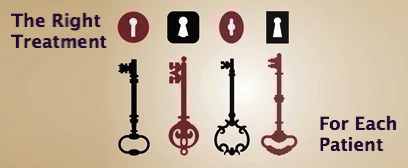In psychiatric disorders, treatment-resistant patients represent high medical costs for management of clinical condition. Studies in literature report high percentage of patients with a treatment resistance. In schizophrenia this percentage is counted to be 20 to 50% [1], whereas in bipolar disorder the resistance occurs in 40% of patients after second generation antipsychotics administration [2] and 25% with use of antidepressants [3], while traditional treatment combination, as mood stabilizers, antipsychotic and SSRI, have less favorable outcome and less evidence based [4]. In other psychiatric conditions as obsessive-compulsive disorders, 40-60% of patients non-respond to use of selective serotonin reuptake inhibitors (SSRIs) [5]. In anxiety disorders, pharmacotherapy reports non response rates of 60–30% and relapses rates of 80–53% [6, 7], while, among depressed patients, up to 40% is unresponsive to at least two trials of antidepressant medication [8].
Causes of treatment-resistance are reported in chronicity of illness, severity of symptomatology, psychiatric comorbidity [9, 10], physical comorbidity [11], personality traits [12] and molecular causes [13]. Other aspect of resistance is due to administration of inadequate treatment for dosage, time of response, compliance, absence or inadequate of augmentation support [4, 14-16].
At the light of these data, to find effective treatments takes particular importance, highlighting the need to improve therapeutic interventions. In this context, personalized psychiatry (PP) represents a way to come to the aid of these shortages.
PP is a branch of personalized medicine that seeks to define different aspects of psychiatric diseases, as vulnerability factors, accuracy of diagnosis and specific goals of treatments with the purpose to increase efficacy of interventions, considering the individual characteristics (e.g. genetic and epigenetic, physiological, psychological, physical, …). [17]
PP fills a wide areas of interest as biogenetic, epigenetic, studies about endophenotypes and biological markers, pharmacological approaches, educational and rehabilitation concerns, and environmental and social researches.
However specific publications about PP are not exhaustive, but they are constituted mainly by review and commentary [18]. Indeed, in literature, researches about PP can highlight two main lacks: 1) in spite of a large amount of research about genetic, pharmacogenetic and epigenetic of psychiatric diseases is published, a clear awareness of common aim, as PP concern, is missing; 2) PP fills mainly specific area disorders as mood and schizophrenia [17] [19], but investigations about other conditions are lacking.
For PP, studies of efficacy of treatments are of particular importance, especially on drug responses. Furthermore, the development of new technologies can improve genetic, genomic and neuroanatomic research focused on the study of new drugs and their efficacy [20]. PP encompasses both sorting who should get what type of treatment based on a personalized measure, but also custom intervention creation (eg customizing a brain stimulation approach).
Actually, PP is an early stage and could be empowered in order to increase healthy and welfare of patients, focusing not only on treatment, but also on prevention and reducing long-term costs, despite initial high economic investments and long procedures [19].
PP require interdisciplinary approach that favor a wide and holistic knowledge about diagnostic criteria, etiopathology and treatment intervention of mental disorders.
- Quintero, J., et al., The evolving concept of Treatment- Resistant Schizophrenia. Actas Esp Psiquiatr, 2011. 39(4): p. 236-50.
- De Fruyt, J., et al., Second generation antipsychotics in the treatment of bipolar depression: a systematic review and meta-analysis. J Psychopharmacol, 2012. 26(5): p. 603-17.
- Sachs, G.S., et al., Effectiveness of adjunctive antidepressant treatment for bipolar depression. N Engl J Med, 2007. 356(17): p. 1711-22.
- Sienaert, P., et al., Evidence-based treatment strategies for treatment-resistant bipolar depression: a systematic review. Bipolar Disord, 2013. 15(1): p. 61-9.
- Abudy, A., A. Juven-Wetzler, and J. Zohar, Pharmacological management of treatment-resistant obsessive-compulsive disorder. CNS Drugs, 2011. 25(7): p. 585-96.
- Pollack, M.H., et al., Novel treatment approaches for refractory anxiety disorders. Depress Anxiety, 2008. 25(6): p. 467-76.
- Rosenbaum, J.F., Treatment-resistant panic disorder. J Clin Psychiatry, 1997. 58 Suppl 2: p. 61-4; discussion 65.
- Eisendrath, S.J., et al., Mindfulness-based cognitive therapy (MBCT) versus the health-enhancement program (HEP) for adults with treatment-resistant depression: a randomized control trial study protocol. BMC Complement Altern Med, 2014. 14(1): p. 95.
- Thase, M.E., Treatment-resistant depression: prevalence, risk factors, and treatment strategies. J Clin Psychiatry, 2011. 72(5): p. e18.
- Seemuller, F., et al., Three-Year long-term outcome of 458 naturalistically treated inpatients with major depressive episode: severe relapse rates and risk factors. Eur Arch Psychiatry Clin Neurosci, 2014.
- Amital, D., et al., Physical co-morbidity among treatment resistant vs. treatment responsive patients with major depressive disorder. Eur Neuropsychopharmacol, 2013. 23(8): p. 895-901.
- Takahashi, M., et al., Personality traits as risk factors for treatment-resistant depression. PLoS One, 2013. 8(5): p. e63756.
- Smith, D.F., Quest for biomarkers of treatment-resistant depression: shifting the paradigm toward risk. Front Psychiatry, 2013. 4: p. 57.
- Elkis, H. and H.Y. Meltzer, [Refractory schizophrenia]. Rev Bras Psiquiatr, 2007. 29 Suppl 2: p. S41-7.
- Leucht, S., et al., Second-generation versus first-generation antipsychotic drugs for schizophrenia: a meta-analysis. Lancet, 2009. 373(9657): p. 31-41.
- Spijker, J., et al., Psychotherapy, antidepressants, and their combination for chronic major depressive disorder: a systematic review. Can J Psychiatry, 2013. 58(7): p. 386-92.
- Ozomaro, U., C. Wahlestedt, and C.B. Nemeroff, Personalized medicine in psychiatry: problems and promises. BMC Med, 2013. 11: p. 132.
- Holmes, M.V., et al., Fulfilling the promise of personalized medicine? Systematic review and field synopsis of pharmacogenetic studies. PLoS One, 2009. 4(12): p. e7960.
- Alda, M., Personalized psychiatry: many questions, fewer answers. J Psychiatry Neurosci, 2013. 38(6): p. 363-5.
- Moller, H.J. and D. Rujescu, Pharmacogenetics–genomics and personalized psychiatry. Eur Psychiatry, 2010. 25(5): p. 291-3.

